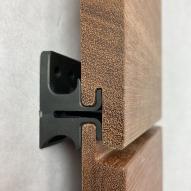Wood with a little fashion sense- Reclaimed Foundry Maple
Phillips-Van Heusen Corporation is mainly known for their men’s dress shirts, as they were first to invent the collar-attached dress shirt in 1920 under the Phillips-Jones Corporation. Over the decades many of their American clothing factories were closed or relocated. One of the few remaining manufacturing factories was ordered to close by May 15, 2006 as the manufacturing work was to move from Ozark, Alabama to facilities overseas. When we heard the news of the plant’s closing, we knew we’d be able to save the fashionable antique wood inside from permanently going out of season. We reclaimed 13,226 board feet of Foundry Maple with stylish colorings ranging from brown and golds, to greys with some lavender tones.
Part of this reclaimed Foundry Maple batch has already found new life and is rockin’ out in its new home at the Guitar Center in NYC. The remainder of this rescue is stacked neatly with our inventory, waiting for its next 100 years of work.
About Van Heusen:
Headquartered in New York City since 1914, they expanded their brand holdings and manufacturing plants to Albany NY, 5 Pennsylvania townships, and by 1950 they operated 12 plants serving over 6,000 stores with over 2,000 styles of garments. As fashion goes, one season they were in and the next they were out, but PVH finally hit their stride in the 1990s with a portfolio of brands including Van Heusen dress shirts, Bass shoes, Gant, Izod, Calvin Klein and Salty Dog brands as well as private-label shirts and sweaters for department stores like Bloomingdales and retailers such as Lands End.
The 90s also brought in a new President and CEO, Bruce J Klatsky, who’s a strong supporter of human rights for oversees workers, leading to changes in the company’s manufacturing policies to keep up with demand. With PVH’s revenue dipping over the years, Klatsky ordered three US shirt factories closed in 1995, choosing to move manufacturing overseas factories where labor and manufacturing was cheaper. By the late 90s, Van Heusen dress shirts were accounting for 23% of the company’s net sales, and were manufactured in Alabama, Arkansas, Costa Rica, Guatemala and Honduras, as well as in independent factories in the Far & Middle East and throughout the Caribbean.





